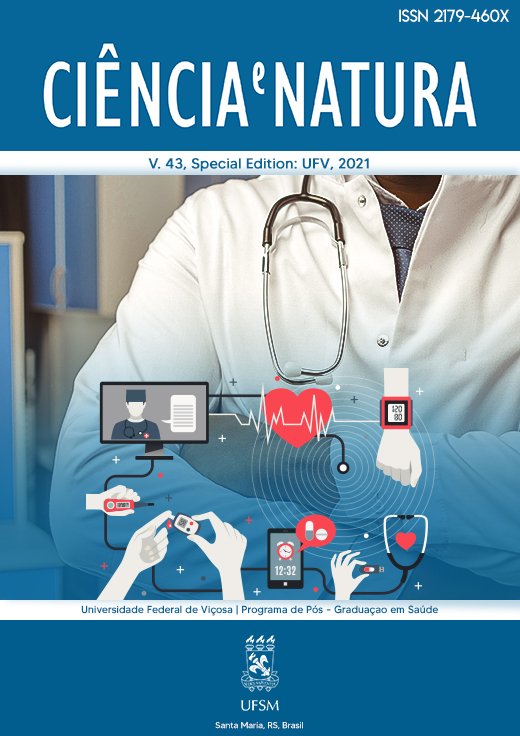Hospital admissions through the National Health System (SUS) in the east of south expanded health region of Minas Gerais, Brazil, between 2014 and 2018
DOI:
https://doi.org/10.5902/2179460X43558Keywords:
Hospitalization, Urgency, Elective, Sensitive to primary care conditionsAbstract
Hospitalizations occur electively in cases with no imminent risk to life or in cases of urgency and emergency, which demand immediate medical assistance. In a Health Region, these hospitalizations are conducted in reference hospitals. This study aimed to analyse hospital admissions in the Eastern South Region of Minas Gerais, by comparing the number of urgency and emergency admissions with elective procedures admissions and with the number of urgency admissions with sensitive to primary care conditions (CSAP). This longitudinal-retrospective-descriptive study was conducted with Hospital Information System (SIH) data relative to the 2014-2018 interval. Altogether, there were registered 129,524 hospitalizations, with 17,546 (13.55%) being elective admissions and 111,978 (86.45%) urgency procedures. Of the urgency hospitalizations total, 20,108 (17.95%) were CASP hospitalizations. The frequency of urgency hospitalization was six times higher than the elective hospitalization one, and even SPCC emergency admissions exceeded the elective hospitalizations offer.
Downloads
References
BARROS JV, DIAS RD. Impacto das internações de Urgência e Emergência no financiamento do Sistema Único de Saúde (SUS) no Brasil. Congresso Internacional de Qualidade em Serviços e Sistemas de Saúde - Qualihosp; 2015; São Paulo, Brasil.
BRASIL; Decreto Nº 7508/2011 - Organização do Sistema Único de Saúde – SUS. Brasília (Brasil): Brasil, 2011.
COELHO MF, GOULAR BF, CHAVES LDP. Urgências Clínicas: Perfil de Atendimentos Hospitalares. Revista da Rede de Enfermagem do Nordeste. 2013;14(1)50-59.
https://www.redalyc.org/articulo.oa?id=324027985007
CONSELHO FEDERAL DE MEDICINA. Resolução CFM-1451/1995. Normas mínimas para funcionamento dos estabelecimentos de saúde de Pronto Socorro. São Paulo (Brasil): CFM; 1995.
DATASUS [Internet]. Brasília: Ministério da Saúde (BR) [cited 2019 jul 19]. Departamento de Informática do SUS – DATASUS. Available from: http://datasus.saude.gov.br/transferencia-de-arquivos/
LOPES, JS. Regionalização da saúde: fluxo de internações pelas condições sensíveis à atenção básica nos municípios brasileiros [dissertation]. Brasília: Faculdade de Ciências da Saúde/UNB; 2018;80p. https://repositorio.unb.br/handle/10482/34575.
MALACHIAS I, LELES FAG, PINTO MAS. Plano Diretor de Regionalização da Saúde de Minas Gerais. Belo Horizonte: Secretaria de Estado de Saúde de Minas Gerais, 2010.
MINISTÉRIO DA SAÚDE; Conselho Nacional de Saúde. Resolução Nº 580/2018– Normas regulamentadoras de pesquisa envolvendo seres humanos. Brasília (Brasil): Ministério da Saúde; 2018.
MINISTÉRIO DA SAÚDE; Secretaria de Atenção à Saúde. Portaria Nº 221/2008 - Política Nacional de Atenção Básica. Brasília (Brasil): Ministério da Saúde; 2008.
MINISTÉRIO DA SAÚDE; Secretaria de Atenção à Saúde. Sistema de Informação Hospitalar. Manual Técnico Operacional do Sistema. Brasília (Brasil): Ministério da Saúde; 2017
MORETI PGS, FEDOSSE E. Núcleos de Apoio à Saúde da Família: impactos nas internações por causas sensíveis à atenção básica. Fisioterapia e Pesquisa. 2016;23(3):241-247. https://doi.org/10.1590/1809-2950/14662023032016
PINTO LF, GIOVANELLA L. Do Programa à Estratégia Saúde da Família: expansão do acesso e redução das internações por condições sensíveis à atenção básica (ICSAB). Ciência & Saúde Coletiva. 2018;23(6):1903-1914. https://doi.org/10.1590/1413-81232018236.05592018
SINDICATO DOS MÉDICOS DE MINAS GERAIS [Internet]. Minas Gerais: Sindicato, notícias [cited 2020 jan 27]. Available from https://sinmedmg.org.br/visualizacao-de-noticias/ler/11243/minas-gerais-lidera-ranking-nacional-de-fila-de-espera-para-cirurgias-eletivas-mais-de-434-mil-pessoas-aguardam-uma-vaga.html
Published
Versions
- 2022-04-06 (2)
- 2021-05-18 (1)
How to Cite
Issue
Section
License
Copyright (c) 2020 Ciência e Natura

This work is licensed under a Creative Commons Attribution-NonCommercial-ShareAlike 4.0 International License.
To access the DECLARATION AND TRANSFER OF COPYRIGHT AUTHOR’S DECLARATION AND COPYRIGHT LICENSE click here.
Ethical Guidelines for Journal Publication
The Ciência e Natura journal is committed to ensuring ethics in publication and quality of articles.
Conformance to standards of ethical behavior is therefore expected of all parties involved: Authors, Editors, Reviewers, and the Publisher.
In particular,
Authors: Authors should present an objective discussion of the significance of research work as well as sufficient detail and references to permit others to replicate the experiments. Fraudulent or knowingly inaccurate statements constitute unethical behavior and are unacceptable. Review Articles should also be objective, comprehensive, and accurate accounts of the state of the art. The Authors should ensure that their work is entirely original works, and if the work and/or words of others have been used, this has been appropriately acknowledged. Plagiarism in all its forms constitutes unethical publishing behavior and is unacceptable. Submitting the same manuscript to more than one journal concurrently constitutes unethical publishing behavior and is unacceptable. Authors should not submit articles describing essentially the same research to more than one journal. The corresponding Author should ensure that there is a full consensus of all Co-authors in approving the final version of the paper and its submission for publication.
Editors: Editors should evaluate manuscripts exclusively on the basis of their academic merit. An Editor must not use unpublished information in the editor's own research without the express written consent of the Author. Editors should take reasonable responsive measures when ethical complaints have been presented concerning a submitted manuscript or published paper.
Reviewers: Any manuscripts received for review must be treated as confidential documents. Privileged information or ideas obtained through peer review must be kept confidential and not used for personal advantage. Reviewers should be conducted objectively, and observations should be formulated clearly with supporting arguments, so that Authors can use them for improving the paper. Any selected Reviewer who feels unqualified to review the research reported in a manuscript or knows that its prompt review will be impossible should notify the Editor and excuse himself from the review process. Reviewers should not consider manuscripts in which they have conflicts of interest resulting from competitive, collaborative, or other relationships or connections with any of the authors, companies, or institutions connected to the papers.







